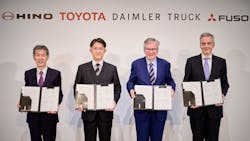Daimler Truck's Mitsubishi Fuso and Toyota's Hino Motors are merging to develop alternative power technologies, such as hydrogen fuel and autonomous trucking, according to a memorandum signed by leaders of both companies.
"This close collaboration will enable us to accelerate the decarbonization of the transportation industry, creating an even stronger Japanese commercial vehicle manufacturer," said Karl Deppen, Mitsubishi Fuso's CEO. "Under the two well-established brands of Fuso and Hino, we will continue to take a leading role in serving customer needs in Japan, Asia, and beyond."
Fuso and Hino would be united under a publicly traded holding company jointly owned by the two global corporations. The announcement comes weeks after Daimler Truck launched Rizon, an all-electric medium-duty truck OEM that will debut with three cab-over Class 4-5 trucks, which was part of the market that Fuso once focused on in North America.
Toyota Motor North America and Paccar have collaborated for years on hydrogen fuel cell electric vehicle (FCEV) technology to power Class 8 trucks. Paccar announced in May that the technology is nearing serial production. It will integrate Toyota's latest heavy-duty hydrogen fuel cell into its two flagship North American on-highway trucks: Kenworth T680 FCEV and Peterbilt 579 FCEV. Paccar plans early customer deliveries in 2024 before serial production begins in 2025.
See also: Volvo finding fuel cell success in Arctic conditions
In 2020, Daimler Truck decided to stop selling its Mitsubishi Fuso trucks in the U.S. and Canada. At the time, Fuso made up 5% of U.S. medium-duty commercial truck sales—but had a more significant presence in European and Asian markets. Daimler is the majority shareholder of Mitsubishi Fuso Truck and Bus Corp.
Hino Motors became a Toyota subsidiary in 2001. Hino had 2.1% of U.S. medium-duty truck sales in 2022, according to American Truck Dealers data. That number increased from less than a percent of market share in 2021.
Fuso was among the first OEMs to show off a battery-electric commercial truck back in 2016. The four companies part of the new Hino-Fuso partnership plan to lean into that innovation, according to a Toyota press release that said they'll develop "CASE technologies (Connected / Autonomous & Automated / Shared / Electric)."
The companies said the Fuso and Hino merger would be on an equal footing and collaborate in commercial vehicle development, procurement, and production. The focus appears to be on Asian markets at the start.
See also:Long-haul's journey to near-zeroDaimler CEO Martin Daum said the four-company partnership "is a crucial step" toward a more sustainable future. "The planned new company will be a major force in Southeast Asia and an important associate of the Daimler Truck family," he said.
Added Toyota CEO Koji Sato: "This collaboration among our four companies is a partnership for creating the future of commercial vehicles in Japan and the future of mobility society. Our four companies will work together with a shared vision of achieving carbon neutrality by strengthening CASE technologies and of changing the future of commercial vehicles and building the future together by solving social issues."
The partnership is expected to take 18 months to finalize, pending shareholder approvals.
For more coverage of this new OEM partnership, read this article from our colleague, Construction Equipment Editorial Director Rod Sutton.
About the Author
Josh Fisher
Editor-in-Chief
Editor-in-Chief Josh Fisher has been with FleetOwner since 2017. He covers everything from modern fleet management to operational efficiency, artificial intelligence, autonomous trucking, alternative fuels and powertrains, regulations, and emerging transportation technology. Based in Maryland, he writes the Lane Shift Ahead column about the changing North American transportation landscape.

